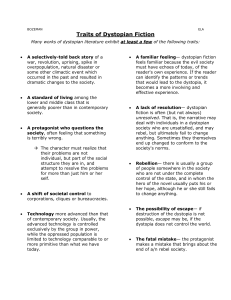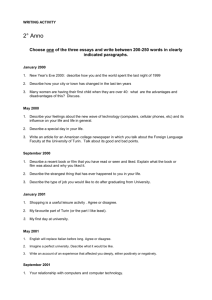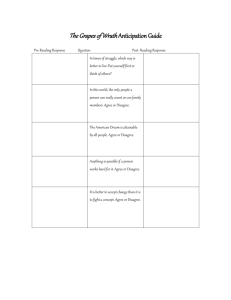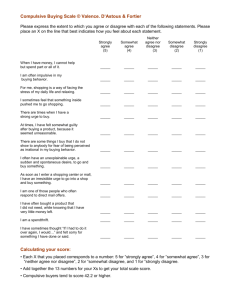Intro to Dystopian Literature
advertisement
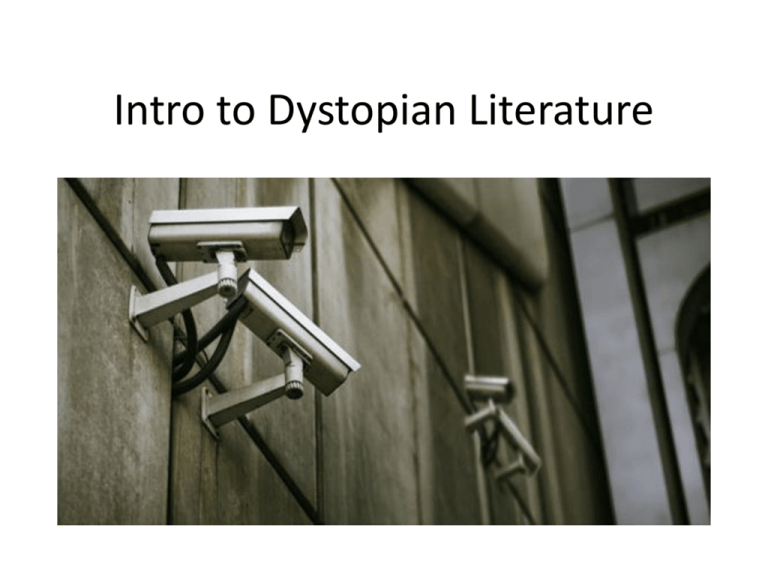
Intro to Dystopian Literature Dystopian Film • As you view the following films, consult the handout describing the characteristics of dystopian literature and take notes as you view the film • You’ll use these notes in your discussion after the films! Gattaca (1997) • This film is set in a future when one’s life is determined by genetic engineering rather than education or experience. The wealthy can choose the genetic makeup of their descendants. People are designed to fit into whatever role is decided before birth. Citizens are fashioned as perfect specimens (aka “Valids”) who dominate. A natural-born “InValid,” Vincent wants to break free from his predetermined fate and pays a DNA broker to assume a “Valid” identity so he can fly into space. The First Seven Minutes: • http://www.youtube.co m/watch?v=9c25ZzUFe PY&feature=related • 1: Gattaca – 30.2 Years http://www.youtube.co m/watch?v=48hnujqpoA • 2: Gattaca – Anton’s Birth: • http://www.youtube.co m/watch?v=lP1cCjBkW ZU&feature=related The Matrix (1999) http://www.youtube.com/watch?v=SdkdQtlF-RU Minority Report (2002) • http://www.youtube.co m/watch?v=QH6UImAP7c • http://www.youtube.co m/watch?v=yyMdrOGh BhI • In the year 2054, “Precrime,” a specialized police department, apprehends criminals based on predictions provided by three psychics called “Precogs.” In this future world criminals are caught before they commit crimes, thus eliminating murder altogether. • One officer in this special unit is accused of a future crime and sets out to prove himself innocent. • Optical Recognition System: a device exists that can track one’s every move through the eyes Consult your notes and break up into groups of 3-4 to discuss the following questions: • What are the worst-case scenarios that these film clips explore? • What illusion of a perfect society is depicted in the clips the class has viewed? • How are the members of this society being oppressed? • What current trend, societal norm, or political system is exaggerated in this world? What criticism is made through the exaggeration in the clips? The Rise of Young Adult Dystopians: The Future Brave New World and 1984 • Consider the following questions that come from an online forum discussion on The New York Times website called “The Dark Side of Young Adult Fiction.” This series was in response to the growing list of bestselling dystopia fiction for young adults, including Hunger Games, Feed, The Maze Runner, Unwind, The Uglies, Matched, Delirium, etc. For each question, mark one of the following: Agree, Somewhat Agree, Somewhat Disagree, Disagree Agree, Somewhat Agree, Disagree, Somewhat Disagree ______ “[Y]oung adults crave stories of broken futures because they themselves are uneasily aware that their world is falling apart.” Agree, Somewhat Agree, Disagree, Somewhat Disagree ______ “[T]eenagers who are loving the dystopian themes are generally the ones who don’t have to face it. […] Would we be so enamored with dystopian fiction if we lived in a culture where violent death was a major concern? It wouldn’t be escapism.” Agree, Somewhat Agree, Disagree, Somewhat Disagree ______ “Schools are places where teens are subject to dress codes, have few free speech rights, and are constantly under surveillance, where they rise and sit at the sound of a bell. Is it any wonder that dystopian novels speak to them?” Questions over “The Lottery” • How does “The Lottery” fit the characteristics of a dystopian text? Consult your notes to support your answer to this question. • What are the origins of the lottery? Why do you think it began? • What different attitudes toward the ritual stoning are represented by (a) Mr. Summers (b) Old Man Warner (c) Mr. and Mrs. Adams (d) Mrs. Hutchinson (e) the villagers in general? • What do you understand to be the writer’s own attitude toward the lottery and the stoning? Exactly what in the story makes her attitude clear to us? • What is the point of view in the story? What is the effect of that point of view? • What do you think Shirley Jackson is driving at in this story? (It might be useful to know that she was a Jewish woman living in a small town in Vermont in 1948 when this story was written; why transport a primitive ritual into a modern setting?; what is the significance of scapegoating?)

